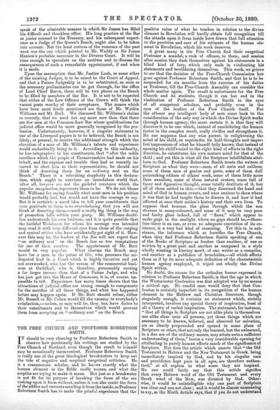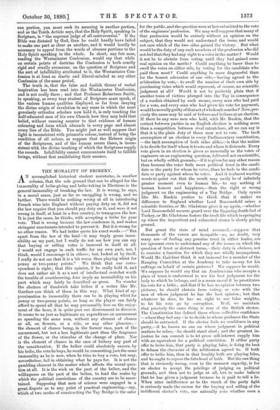THE FREE CHURCH AND PROFESSOR ROBERTSON
SMITH.
IT should be very cheering to Professor Robertson Smith to
observe how persistently his writings are studied by the Free Church of Scotland, even though the result to himself may be occasionally inconvenient. Professor Robertson Smith is really one of the great theological breakwaters to keep out the tide of negative and sceptical exegetical criticism. He is a consummate scholar, and he knows exactly what the human element in the Bible really means, and what the sceptics are trying to make it. mean. But just as a breakwater is not fit for its purpose of breaking the force of the sea rushing upon it from without, unless it can also resist the force of the eddies and currents assailing it from the inside, so Professor Robertson Smith has to make the painful experience that the
positive value of what he teaches in relation to the divine element in Revelation will hardly obtain full recognition till
the attacks upon it from inside have drawn that full attention to the precision and care of his estimate of the human ele- ment in Revelation, which his work deserves.
A great many in the Free Church find their exegetical Professor a scandal, a rock of offence, to them, and session
after session they dash themselves against his statements in a blind kind of fury, which only ends in vindicating his statements and bewildering themselves. This week, we grieve to see that the decision of the Free-Church Commission has gone against Professor Robertson Smith, and that he is to be
suspended for six months from the exercise of his duties as Professor, till the Free-Church Assembly can consider the
whole matter again. The result is unfortunate for the Free
Church and its students, though it can but end in the vindication of Professor Robertson Smith in the eyes
of all competent scholars, and probably even in the eyes of the leaders of the Free Church itself. For the oftener any intelligent body of men come back to the consideration of the only way id which the Divine Spirit works through human agency, the more certain it is that they will discover it to be one which, instead of annihilating the human factor in the complex result, really vivifies and strengthens it. No one supposes that any wise parent, in enlightening the mind of his child, so supersedes its half-thoughts and imper- fect impressions of what he himself fully knows, that instead of opening his child's mind to the right kind of efforts in the right direction, he substitutes his own mature mind for that of the child ; and yet this is what all the Scripture infallibilists attri- bute to God. Professor Robertson Smith treats the writers of Scripture as what they were—men, of all sorts and calibres, some of them men of genius and poets, some of them dull painstaking editors of others' work, some of them little more than annalists, some of them natural orators, some full of fancy and figurative thought, some totally destitute of it, but all of them united in this,—that they discerned the hand and mind of God in human events, and were anxious to show where it was that he had taught them to discern it, and how it had affected at once their nation's history and their own lives. To suppose that because the glass through which the sun streams is many-coloured, and some of it may be very poor and faulty glass indeed, full of "flaws," which appear to make gaps in the sunlight where no gaps should be,—there- fore there is no sun, or even no adequate conviction of its ex- istence, is a very bad kind of reasoning. Yet this is, in sub- stance, the inference which so horrifies the Free Church, when they find Professor Robertson Smith speaking of one of the Books of Scripture as fresher than another, of one as written by a great poet and another as composed in a style wholly wanting in literary merit, of one writer as a compiler, and another as a publisher of broadsides,—all which affects them as if by its more adequate definition of the characteristic human agency employed, it wiped out wholly the Divine Spirit within.
No doubt, the excuse for the orthodox horror expressed in relation to Professor Robertson Smith, is that the age in which the Westminster Confession was first adopted was by no means a critical age. No candid man would deny that that Con- fession is certainly imperfect in its recognition of the human element in the Hebrew and Christian literature, though singularly enough, it contains no statement which, strictly interpreted, involves any special theory of inspiration, least of all a theory of verbal inspiration. The statement, for instance, "that all things in Scripture are not alike plain in themselves nor alike clear unto all persons, yet those things which are necessary to be known, believed, and observed for salvation, are so clearly propounded and opened in some place of Scripture or other, that not only the learned, but the unlearned, in a due use of the ordinary means, may attain unto a sufficient understanding of them," leaves a very considerable opening for attributing to purely human effects much of the significance of Scripture. Nor does the article which asserts that "the Old Testament in Hebrew and the New Testament in Greek, being immediately inspired by God, and by his singular care and providence kept pure in all ages, are therefore authen- tical," at all explain in what sense they are inspired. No one could fairly say that this article signifies that every Hebrew word of the- Old Testament and every
Greek word of the New, was dictated by God. Other- wise, it would be unintelligible why one part of Scripture was clear and one not clear ; and it would be almost unmeaning to say, as the Ninth Article says, that if you do not understand
one portion, you must seek its meaning in another portion, and as the Tenth Article says, that the Holy Spirit, speaking in Scripture, is "the supreme judge of all controversies." If the Bible was dictated by God, then he could hardly have failed to make one part as clear as another, and it would hardly be necessary to appeal from the words of obscure portions to the Holy Spirit speaking in the whole. In short, any fair man, reading the Westminster Confession, would say that while on certain points of doctrine the Confession is both cruelly rigid and cruelly erroneous, on the question of Scripture and the sort of infallibility attributed to it, the Westminster Con- fession is at least as elastic and liberal-minded as any other Confession of the same period.
The truth is, that the false and foolish theory of verbal inspiration has been read into the Westminster Confession, and is not really there ; and that Professor Robertson Smith, in speaking, as every true student of Scripture must speak, of the various human qualities displayed, so far from denying the divine origin of revelation in any sense in which the most genuinely orthodox scholars now hold it, is only teaching the half-educated men of his own Church how they may hold that belief, without running counter to that evidence of human colouring and form which abounds in every page and almost every line of the Bible. You might just as well suppose that light is inconsistent with prismatic colour, instead of being the condition of all colour, as suppose that the Hebrew origin of the Scriptures, and of the human errors there, is incon- sistent with the divine teaching of which the Scriptures supply the records. Infallibility cannot communicate itself to fallible beings, without first annihilating their essence.







































 Previous page
Previous page